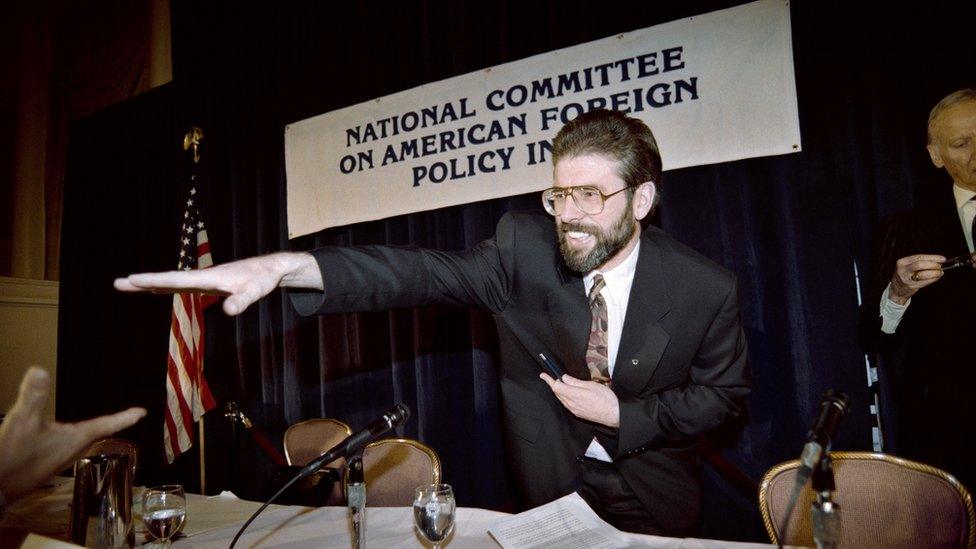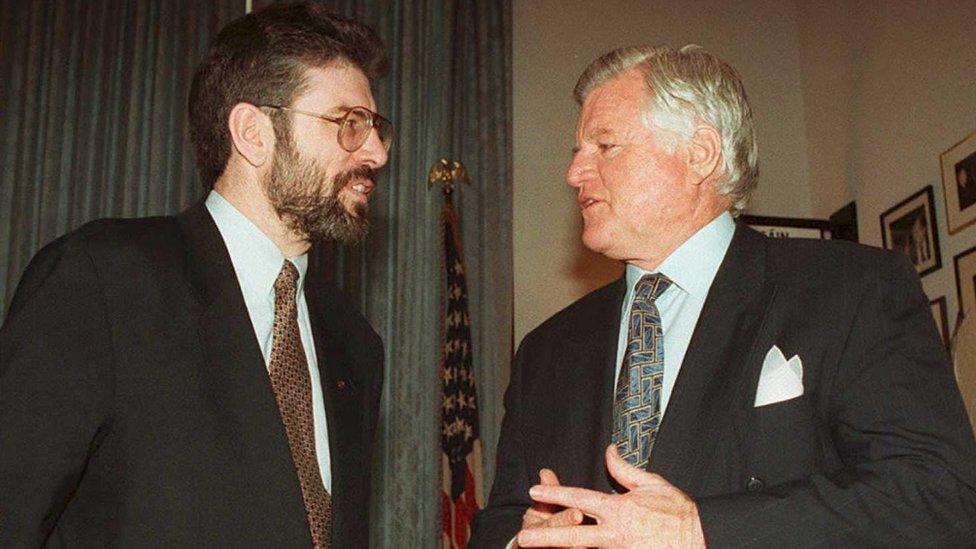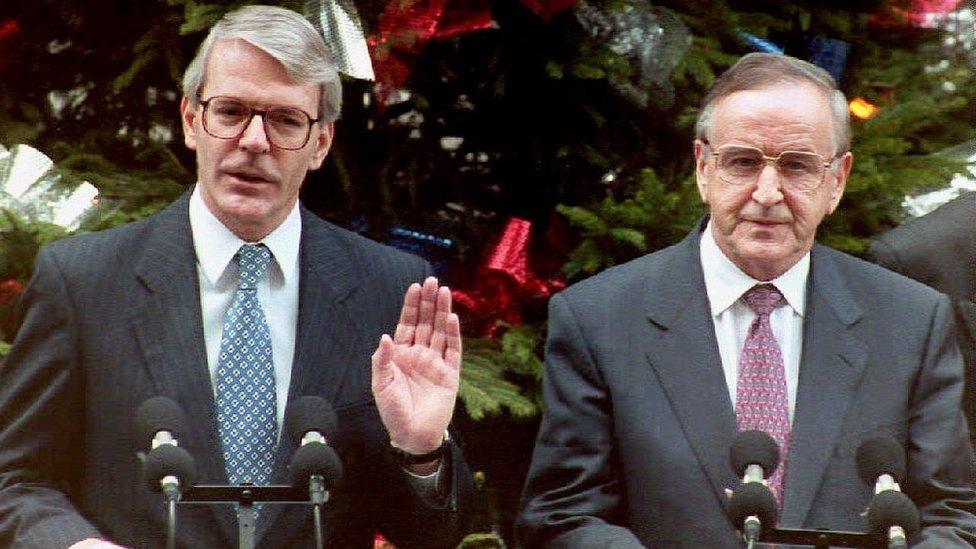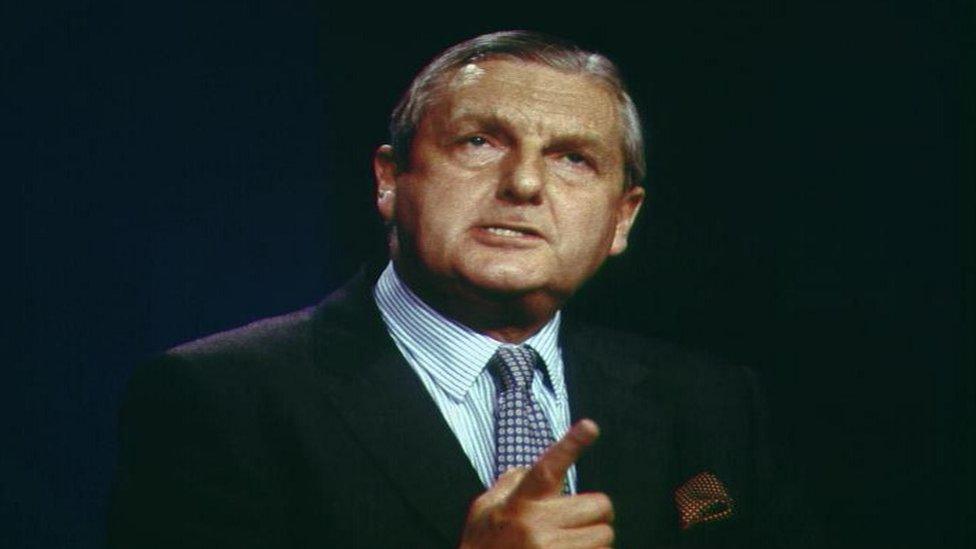State papers: Last-ditch effort to stop Adams' US visa revealed
- Published

Bill Clinton approved the issuing of a temporary visa for Gerry Adams to attend a conference in New York in 1994
Efforts by the Northern Ireland Office (NIO) to block the granting of a US visa to Gerry Adams in 1994 continued until days before it was granted.
The Sinn Féin president had been asked to speak at a New York conference.
There were concerns in both Washington DC and at the NIO about granting the visa while the IRA campaign continued in Northern Ireland.
The political wrangling is revealed in confidential files released on Friday by the Public Record Office (PRONI).
The invitation came a month after the Downing Street Declaration.
On 15 December Prime Minister John Major and Taoiseach (Irish Prime Minister) Albert Reynolds delivered the outline of a plan they hoped would lead to peace and multi-party talks in Northern Ireland.
Mr Adams had been asked to speak, along with SDLP leader John Hume and DUP leader Ian Paisley, by the National Committee on American Foreign Policy (NCAFP), at a forthcoming conference on Northern Ireland in New York.
'Divided views'
The 4 January letter from the NCAFP said Northern Ireland "is of great interest to Americans, especially those 44 million of Irish descent who are drawn almost equally from the two great traditions of Ireland".
In a note on the file to Northern Ireland Secretary Sir Patrick Mayhew, David Fell, a senior Stormont official, described NCAFP as a prestigious body.
He said he learned from the US consul general in Belfast, Val Martinez, that there were "divided views" within the US administration on the question of whether it was "sensible to try and give Adams help in selling the declaration to the "hard men in the Provisional IRA".

Mr Adams meeting with Senator Ted Kennedy in Washington DC in March 1995
Events moved up a key when the British ambassador to Washington, Sir Robin Renwick, informed the NIO on 15 January that Senator Ted Kennedy, along with three other senators, had written to President Bill Clinton arguing that a visa should be granted to Mr Adams.
They claimed that "the Hume-Adams dialogue and the British government's contacts with the IRA [revealed in November 1993] had changed things".
The senators were now hearing that there was a split within the IRA and that obtaining a US visa might help Mr Adams win support for '"his moderate position".
All four, Sir Robin added, were supporters of the Downing Street Declaration and did not want "to 'let slip' this opportunity to increase nationalist support for it".
In response, the ambassador told the NIO he had left "Kennedy's people in no doubt of our views".
"Adams knew that if he and the organisations he represented renounced violence, and meant it, they would be welcome to join in the political process," he said.
However, "it was wrong in principle and wrong tactically to reward Adams before he had taken that step".
In a further telex to London, the ambassador said that the battle for Adams' visa was "by no means won" and that the State Department, FBI and Justice Department were all recommending against it.
However, he went on: "Domestic political advisers and the White House were liable to be influenced by the Kennedy/Moynihan intervention and that the fact that the Irish PM was raising no objection."

On 15 December 1993 the British and Irish governments issued a joint declaration outlining the terms they hoped would bring about peace
Downing Street now decided that "the White House needed stiffening against political pressures to grant a visa to Adams on unacceptably soft conditions".
Prime Minister John Major's private secretary made several attempts to contact Tony Lake, the president's national security adviser.
"I told Lake's secretary on the secure telephone that private indications suggested strongly that the Provisionals had decided not to accept the Joint Declaration as it stood and were deliberately stringing us and the Irish government along in the hope of obtaining concessions - hence their call for 'clarification'," he said.
"I added that Sinn Féin was likely to increase the level of violence. It would surely be embarrassing for the Americans if they let Adams in, only to find IRA violence was increasing."

Sir Patrick Mayhew was the longest-serving Secretary of State for Northern Ireland, holding the post from 1992-1997
On 22 January, Lake phoned Downing Street - the news was not good for the British.
Lake confirmed that a conditional visa would be granted if Adams stated publicly that:
He personally renounced violence and urged all parties to the conflict to do so
Sinn Fein and the IRA were prepared "to participate in serious negotiations to end the conflict"
He accepted the Joint Declaration as a basis
In a final push to block the visa, Sir Patrick saw the US ambassador to Britain, Ray Seitz, in London on 25 January.
The NI secretary impressed on the ambassador: "The fact was Adams had to renounce violence. Granting this favour before that would be completely wrong - in NI terms and also dangerous in terms of the US-UK relationship."
His intervention failed and on 27 January 1994, Stephens of the NIO informed him that the US would issue a visa to Mr Adams on 28 January.
Dr Éamon Phoenix is a political historian, broadcaster and commentator.